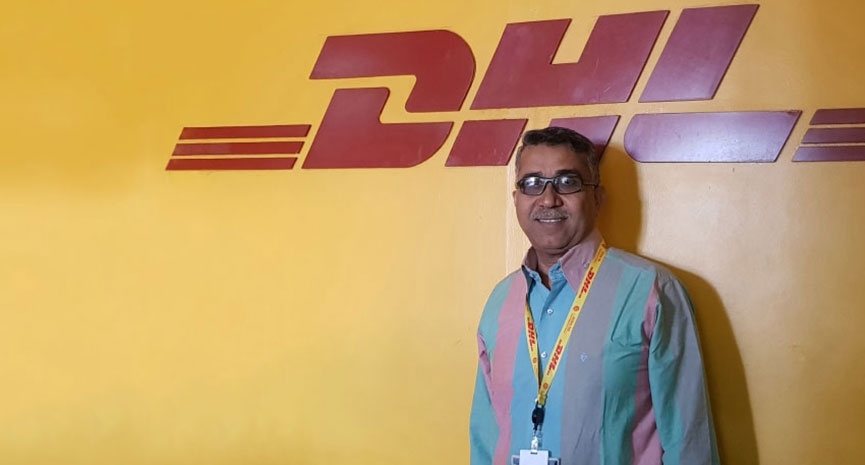FROM MAGAZINE: We want to help whoever wants to do business here
Sub-Saharan Africa has some of the fastest-growing economies in the world. Being a logistics company in this part of the world comes with a lot of opportunities but not without challenges. Pramod Bagalwadi, Chief Executive Officer - Sub-Saharan Africa, DHL Global Forwarding speaks to Libin Chacko Kurian about

Sub-Saharan Africa has some of the fastest-growing economies in the world. Being a logistics company in this part of the world comes with a lot of opportunities but not without challenges. Pramod Bagalwadi, Chief Executive Officer - Sub-Saharan Africa, DHL Global Forwarding speaks to Libin Chacko Kurian about DHL, his journey with DHL, the SSA market and future.
How important is Sub-Saharan Africa for DHL Global Forwarding?
Africa is one of our network’s fastest-growing markets. With rising disposable incomes and more stable economic and socio-political environment, Africa as a region presents many opportunities for businesses. Sub-Saharan Africa (SSA) is an undisputed Integral part of our global focus due to its size and potential – with a population of about 1.06 billion, and GDP growth expected to reach almost 4% in 2020 allowing us to expand compliantly.
The region encompasses the majority of the top ten fastest-growing economies in the world.
The latest DHL Global Connectedness Index, which measures the flows of internal trade, capital, information and people between different countries, ranked the Middle East and North Africa as the world’s third most connected region after Europe and North America. Sub-Saharan African nations like Nigeria, Sierra Leone and Guinea also showed remarkably substantial improvements, while Mozambique was singled out as one of the five countries globally to most exceed expectations in terms of global connectivity.
Can you give country-wise or commodity wise examples?
Every country in the region has its niche commodities and we want to capitalize on leveraging these opportunities, backed by our global compliance practices and operating standards. Some examples include Oil & Gas sector in Angola, Nigeria, Gabon, the mining sector in Ghana and perishable exports from Kenya, Cameroon, Senegal as well as vanilla exports from Madagascar.
We always build solutions to address our customer’s challenges based on the buying terms, operational flexibility and security. We handle perishables exports from Cameroon or Senegal to Europe during the perishables season every year for specific shippers. Similar solutions such as the transport of niche flowers for importers based in Europe and lastly for high-value commodities like Vanilla exports from Madagascar.
Specific to vanilla from Madagascar:
As we have to first move these goods from North Eastern region of Madagascar by road to Antalaha and then by sea to Tamatave followed by road to Antananarivo for final exports by air, we offer 2 solutions based on the urgency of the cargo.
Direct Local Charter flight from Vanilla Region (Sambava, Antalaha, Vohemar ) to Antananarivo. OR
Road-Sea-Road-Road to Antananarivo which is cost-effective than the charter.
As a value add, we can keep the shipment in our transit warehouse in TNR awaiting the connection flight for the destination. Secondly, we are in partnership with a well-known survey company that specializes in the movement of sensitive commodities like Vanilla who can provide live reporting from start to finish. This is in addition to the security escort of each vehicle with the armed force to avoid any mishap.
How important is DHL Global Forwarding for Sub-Saharan Africa?
It is no surprise that many global brands want to come to Africa and participate in this journey for mutual benefits. When these global brands, MNCs and service companies do business here, they want to deal with logistics companies that can conduct business in a compliant way. We want to extend our services and infrastructure to our global customers and partners who want to venture into this continent with huge opportunities.
We are also cultural experts in our field of business – we operate in each diverse market in Africa with the best of local talents who are sensitive to cultural nuances and local business practices. We have one of the best local infrastructure operated on our global systems and processes to harmonize the services to our global standard.
Can you briefly tell us about the journey since you started working for DHL?
The journey I started in 1996, has been an exciting one to date. I have been assigned to work in different countries in challenging roles finding innovative solutions engaging the teams to achieve our common objective.
I am lucky to have been allowed to handle every activity of logistics and supply chain in DHL such as establishing business units from scratch and making them successful and taking charge of strategy and industrial projects. It’s been a fantastic journey with achievements in every assignment throughout Africa- Kenya, Dubai, Nigeria, Ghana, East Africa. Leadership achievement is only sustainable when we develop a handful of leaders under the succession plan and this is what I am trying to achieve in our region.
We are embracing the digitalization journey which will transform the way we conduct ourselves bringing all the key virtues (visibility, transparency, accountability and speed ) to run our businesses effectively.
DHL Global Forwarding Middle East & Africa has recently been awarded the ISO 22301: Business Continuity Management System (BCM).
We are today in a very disruptive world and our normal operations can be affected with growing challenges. We ought to ensure the continuity of our operations as a lot of our customers are depending on our services. We need our robust systems and emergency operational plan to keep the business going. This is what it means to us and our customers.
Tell us about the joint venture with Ethiopian Airlines.
This partnership is very important for us as we want to connect the 110 million people in Ethiopia to the logistics world and improve their lives daily. It’s a combined effort of DHL and Ethiopian Airlines to bring world-class logistical solutions to Ethiopia to enhance their competitive edge against all others in the region. We are present today in Addis Airport, Djibouti Port, Bole Lemi and Hawassa Industrial Park.
Today we are in a position to provide the door-to-door solutions, freight collect option, customs clearance solution under one roof, consolidation services for imports and exports by air and ocean, implant, control tower etc.
I was reading an old report you wrote for DHL in 2015 about the skill gap in East Africa. What has changed since?
Kenya has become a competency centre for us on international supply chain solution. We need competency centres to develop and groom these specialized solutions and we are glad that these are now easily available in our region to continue investing in our people with latest trends, solutions, technology, innovation etc.
This feature was originally published in March - April 2020 issue of Logistics Update Africa.


